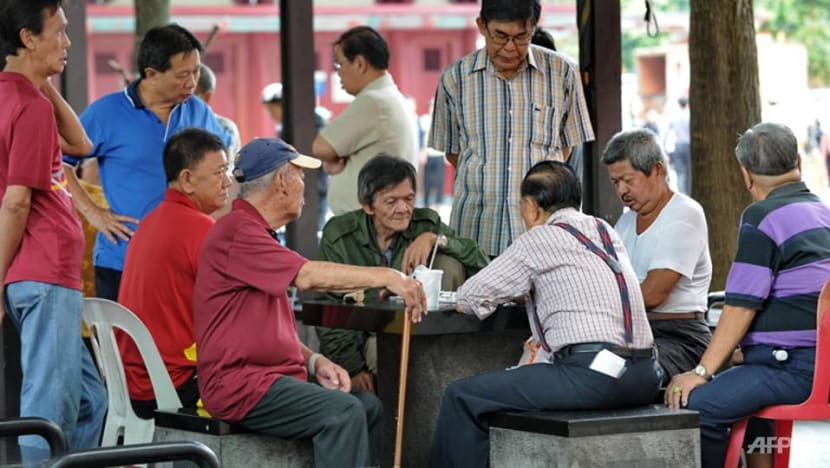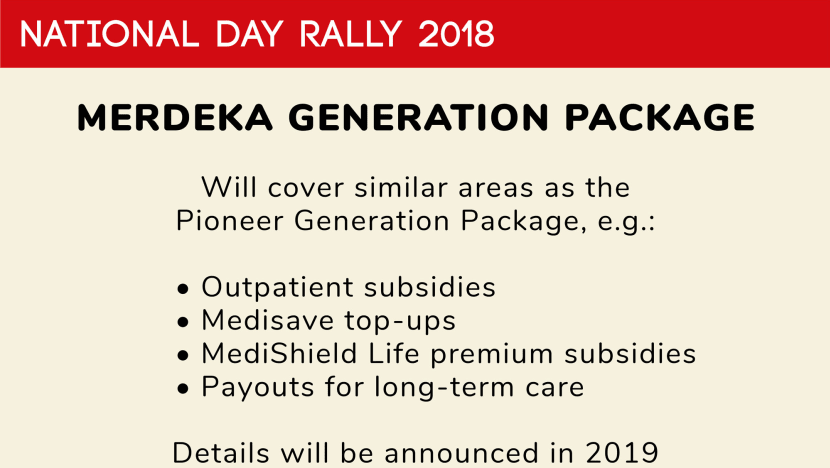NDR 2018: ‘Merdeka Generation’ healthcare package for Singaporeans born in ’50s
It will cover similar areas as the Pioneer Generation Package, but cater to the medical needs of a group mostly in their 60s today.

Middle-aged and elderly men playing checkers in their housing area in Singapore (Photo: AFP/Roslan Rahman)
SINGAPORE: Prime Minister Lee Hsien Loong on Sunday (Aug 19) announced a Merdeka Generation Package to help with the medical expenses of some 500,000 Singaporeans born in the 1950s.
Speaking at the 2018 National Day Rally, he said details will be announced next year but the package – to be implemented using “a significant sum” - will include the likes of outpatient subsidies, Medisave top ups, premium subsidies for the MediShield Life insurance scheme and payouts for long term care.
These are similar areas covered by the S$8 billion Pioneer Generation Package (PGP) launched in 2014 to assist with healthcare costs.

So far more than S$1.3 billion has been spent on the PGP to help approximately 450,000 of these “pioneers”, said PM Lee.
“We have taken special care of elderly Singaporeans,” he added. “When we introduced the PGP, we knew that Singaporeans a little younger than the pioneers would just miss out ... We have not forgotten this group.”
For this generation, which the 66-year-old Prime Minister said he was “proud” to be part of, the meaning of the Malay word “Merdeka” - liberation, freedom, independence - holds significance.
“They lived through the tumultuous years of the '50s and the early '60s,” he explained, citing political milestones such as the departure from British colonial rule, the formation of Government in 1959, merger and separation with Malaysia, and eventual independence.
“WE OWE SOMETHING TO THEM”
The prime minister described the Singaporeans born in the 1950s as having lived through “battles and upheavals” and also witnessing how their parents “scraped and slogged” for them.
“They understood instinctively what was at stake … The men were among the earliest batches called up for National Service. They were the first of the SAF (Singapore Armed Forces) - the Army, Navy and Air Force,” he added. “Many, especially the girls, didn't complete their education. They came out to work early, to support the family and younger siblings.
“Some joined the workforce amidst economic uncertainty and high unemployment, as the British Forces withdrew from Singapore. All started working when wages were still low.”
PM Lee noted that most of the Merdeka Generation today would be in their 60s.
“They have either left the workforce, or will soon be retiring,” he said. “Many have similar healthcare concerns as the pioneers. They are looking at their CPF (Central Provident Fund) savings and Medisave accounts, worried about having enough for their medical needs as they grow older.
“I think we owe something to them.”
But PM Lee cautioned that their benefits would not be as large as for the pioneers, who had “much less advantage in life”.
“They (the Merdeka Generation) were born later, they benefitted from an extra decade of economic growth. And they were generally better educated than the Pioneers, especially the younger ones,” he explained. “The Merdeka Generation earned more over their lifetimes, and accumulated more CPF savings, because in the early '80s, wages increased sharply, CPF rates also went up significantly.”
Still, the new Merdeka Generation Package will “go some way” to relieve the healthcare worries of these Singaporeans, PM Lee summed up.
“More importantly, it will show our appreciation for the Merdeka Generation and their contributions.”














